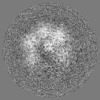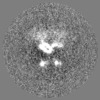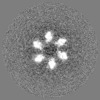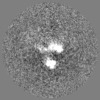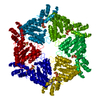[English] 日本語
 Yorodumi
Yorodumi- EMDB-6204: Structure of ATP-bound N-ethylmaleimide sensitive factor determin... -
+ Open data
Open data
- Basic information
Basic information
| Entry | Database: EMDB / ID: EMD-6204 | |||||||||
|---|---|---|---|---|---|---|---|---|---|---|
| Title | Structure of ATP-bound N-ethylmaleimide sensitive factor determined by single particle cryoelectron microscopy | |||||||||
 Map data Map data | Map of ATP-bound N-ethylmaleimide sensitive factor. This map is unsharpened and unfiltered. The map was normalized using the program MAPMAN. | |||||||||
 Sample Sample |
| |||||||||
 Keywords Keywords | ATPases associated with diverse cellular activities | |||||||||
| Function / homology |  Function and homology information Function and homology informationSNARE complex disassembly / ATP-dependent protein disaggregase activity / intra-Golgi vesicle-mediated transport / Golgi to plasma membrane protein transport / Golgi stack / vesicle-fusing ATPase / syntaxin-1 binding / positive regulation of receptor recycling / SNARE binding / PDZ domain binding ...SNARE complex disassembly / ATP-dependent protein disaggregase activity / intra-Golgi vesicle-mediated transport / Golgi to plasma membrane protein transport / Golgi stack / vesicle-fusing ATPase / syntaxin-1 binding / positive regulation of receptor recycling / SNARE binding / PDZ domain binding / intracellular protein transport / ionotropic glutamate receptor binding / potassium ion transport / positive regulation of protein catabolic process / midbody / protein-containing complex binding / protein kinase binding / ATP hydrolysis activity / ATP binding / identical protein binding / metal ion binding / plasma membrane / cytosol Similarity search - Function | |||||||||
| Biological species |  | |||||||||
| Method | single particle reconstruction / cryo EM / Resolution: 4.2 Å | |||||||||
 Authors Authors | Zhao M / Wu S / Zhou Q / Vivona S / Cipriano DJ / Cheng Y / Brunger AT | |||||||||
 Citation Citation |  Journal: Nature / Year: 2015 Journal: Nature / Year: 2015Title: Mechanistic insights into the recycling machine of the SNARE complex. Authors: Minglei Zhao / Shenping Wu / Qiangjun Zhou / Sandro Vivona / Daniel J Cipriano / Yifan Cheng / Axel T Brunger /  Abstract: Evolutionarily conserved SNARE (soluble N-ethylmaleimide sensitive factor attachment protein receptors) proteins form a complex that drives membrane fusion in eukaryotes. The ATPase NSF (N- ...Evolutionarily conserved SNARE (soluble N-ethylmaleimide sensitive factor attachment protein receptors) proteins form a complex that drives membrane fusion in eukaryotes. The ATPase NSF (N-ethylmaleimide sensitive factor), together with SNAPs (soluble NSF attachment protein), disassembles the SNARE complex into its protein components, making individual SNAREs available for subsequent rounds of fusion. Here we report structures of ATP- and ADP-bound NSF, and the NSF/SNAP/SNARE (20S) supercomplex determined by single-particle electron cryomicroscopy at near-atomic to sub-nanometre resolution without imposing symmetry. Large, potentially force-generating, conformational differences exist between ATP- and ADP-bound NSF. The 20S supercomplex exhibits broken symmetry, transitioning from six-fold symmetry of the NSF ATPase domains to pseudo four-fold symmetry of the SNARE complex. SNAPs interact with the SNARE complex with an opposite structural twist, suggesting an unwinding mechanism. The interfaces between NSF, SNAPs, and SNAREs exhibit characteristic electrostatic patterns, suggesting how one NSF/SNAP species can act on many different SNARE complexes. | |||||||||
| History |
|
- Structure visualization
Structure visualization
| Movie |
 Movie viewer Movie viewer |
|---|---|
| Structure viewer | EM map:  SurfView SurfView Molmil Molmil Jmol/JSmol Jmol/JSmol |
| Supplemental images |
- Downloads & links
Downloads & links
-EMDB archive
| Map data |  emd_6204.map.gz emd_6204.map.gz | 48.7 MB |  EMDB map data format EMDB map data format | |
|---|---|---|---|---|
| Header (meta data) |  emd-6204-v30.xml emd-6204-v30.xml emd-6204.xml emd-6204.xml | 10.9 KB 10.9 KB | Display Display |  EMDB header EMDB header |
| Images |  emd_6204.png emd_6204.png | 138.8 KB | ||
| Others |  emd_6204_additional_1.map.gz emd_6204_additional_1.map.gz emd_6204_additional_2.map.gz emd_6204_additional_2.map.gz | 59.7 MB 59.5 MB | ||
| Archive directory |  http://ftp.pdbj.org/pub/emdb/structures/EMD-6204 http://ftp.pdbj.org/pub/emdb/structures/EMD-6204 ftp://ftp.pdbj.org/pub/emdb/structures/EMD-6204 ftp://ftp.pdbj.org/pub/emdb/structures/EMD-6204 | HTTPS FTP |
-Validation report
| Summary document |  emd_6204_validation.pdf.gz emd_6204_validation.pdf.gz | 400.7 KB | Display |  EMDB validaton report EMDB validaton report |
|---|---|---|---|---|
| Full document |  emd_6204_full_validation.pdf.gz emd_6204_full_validation.pdf.gz | 400.3 KB | Display | |
| Data in XML |  emd_6204_validation.xml.gz emd_6204_validation.xml.gz | 6.4 KB | Display | |
| Arichive directory |  https://ftp.pdbj.org/pub/emdb/validation_reports/EMD-6204 https://ftp.pdbj.org/pub/emdb/validation_reports/EMD-6204 ftp://ftp.pdbj.org/pub/emdb/validation_reports/EMD-6204 ftp://ftp.pdbj.org/pub/emdb/validation_reports/EMD-6204 | HTTPS FTP |
-Related structure data
| Related structure data |  3j94MC  6205C  6206C  6207C  6208C  6209C  6210C  3j95C  3j96C  3j97C  3j98C  3j99C M: atomic model generated by this map C: citing same article ( |
|---|---|
| Similar structure data |
- Links
Links
| EMDB pages |  EMDB (EBI/PDBe) / EMDB (EBI/PDBe) /  EMDataResource EMDataResource |
|---|---|
| Related items in Molecule of the Month |
- Map
Map
| File |  Download / File: emd_6204.map.gz / Format: CCP4 / Size: 62.5 MB / Type: IMAGE STORED AS FLOATING POINT NUMBER (4 BYTES) Download / File: emd_6204.map.gz / Format: CCP4 / Size: 62.5 MB / Type: IMAGE STORED AS FLOATING POINT NUMBER (4 BYTES) | ||||||||||||||||||||||||||||||||||||||||||||||||||||||||||||||||||||
|---|---|---|---|---|---|---|---|---|---|---|---|---|---|---|---|---|---|---|---|---|---|---|---|---|---|---|---|---|---|---|---|---|---|---|---|---|---|---|---|---|---|---|---|---|---|---|---|---|---|---|---|---|---|---|---|---|---|---|---|---|---|---|---|---|---|---|---|---|---|
| Annotation | Map of ATP-bound N-ethylmaleimide sensitive factor. This map is unsharpened and unfiltered. The map was normalized using the program MAPMAN. | ||||||||||||||||||||||||||||||||||||||||||||||||||||||||||||||||||||
| Projections & slices | Image control
Images are generated by Spider. | ||||||||||||||||||||||||||||||||||||||||||||||||||||||||||||||||||||
| Voxel size | X=Y=Z: 1.2156 Å | ||||||||||||||||||||||||||||||||||||||||||||||||||||||||||||||||||||
| Density |
| ||||||||||||||||||||||||||||||||||||||||||||||||||||||||||||||||||||
| Symmetry | Space group: 1 | ||||||||||||||||||||||||||||||||||||||||||||||||||||||||||||||||||||
| Details | EMDB XML:
CCP4 map header:
| ||||||||||||||||||||||||||||||||||||||||||||||||||||||||||||||||||||
-Supplemental data
-Supplemental map: emd 6204 additional 1.map
| File | emd_6204_additional_1.map | ||||||||||||
|---|---|---|---|---|---|---|---|---|---|---|---|---|---|
| Projections & Slices |
| ||||||||||||
| Density Histograms |
-Supplemental map: emd 6204 additional 2.map
| File | emd_6204_additional_2.map | ||||||||||||
|---|---|---|---|---|---|---|---|---|---|---|---|---|---|
| Projections & Slices |
| ||||||||||||
| Density Histograms |
- Sample components
Sample components
-Entire : ATP-bound N-ethylmaleimide sensitive factor
| Entire | Name: ATP-bound N-ethylmaleimide sensitive factor |
|---|---|
| Components |
|
-Supramolecule #1000: ATP-bound N-ethylmaleimide sensitive factor
| Supramolecule | Name: ATP-bound N-ethylmaleimide sensitive factor / type: sample / ID: 1000 / Details: Wild type full-length construct. / Oligomeric state: hexamer / Number unique components: 1 |
|---|---|
| Molecular weight | Theoretical: 500 KDa |
-Macromolecule #1: N-ethylmaleimide sensitive factor
| Macromolecule | Name: N-ethylmaleimide sensitive factor / type: protein_or_peptide / ID: 1 / Name.synonym: NSF / Number of copies: 6 / Oligomeric state: hexamer / Recombinant expression: Yes |
|---|---|
| Source (natural) | Organism:  |
| Molecular weight | Theoretical: 83 KDa |
| Recombinant expression | Organism:  |
| Sequence | UniProtKB: Vesicle-fusing ATPase |
-Experimental details
-Structure determination
| Method | cryo EM |
|---|---|
 Processing Processing | single particle reconstruction |
| Aggregation state | particle |
- Sample preparation
Sample preparation
| Concentration | 15 mg/mL |
|---|---|
| Buffer | pH: 8 Details: 50 mM Tris-Cl, 150 mM NaCl, 1 mM EDTA, 1 mM ATP, 1 mM DTT, 0.05% v/v Nonident P-40 |
| Grid | Details: Holey carbon on top of 400 mesh copper grid |
| Vitrification | Cryogen name: ETHANE / Chamber humidity: 100 % / Chamber temperature: 90 K / Instrument: FEI VITROBOT MARK I / Method: Blot for 3.5 seconds before plunging. |
- Electron microscopy
Electron microscopy
| Microscope | FEI POLARA 300 |
|---|---|
| Date | Feb 28, 2014 |
| Image recording | Category: CCD / Film or detector model: GATAN K2 (4k x 4k) / Average electron dose: 26.4 e/Å2 Details: Gatan K2 Summit in super-resolution counting mode. Motion correction as described in Li et al. (2013) Nature Methods. |
| Electron beam | Acceleration voltage: 300 kV / Electron source:  FIELD EMISSION GUN FIELD EMISSION GUN |
| Electron optics | Illumination mode: FLOOD BEAM / Imaging mode: BRIGHT FIELD / Cs: 2.3 mm / Nominal defocus max: -2.8 µm / Nominal defocus min: -1.8 µm / Nominal magnification: 31000 |
| Sample stage | Specimen holder model: OTHER |
| Experimental equipment | 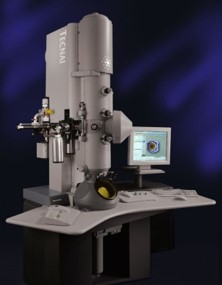 Model: Tecnai Polara / Image courtesy: FEI Company |
- Image processing
Image processing
| Details | 3D classification, refinement, and reconstruction were performed using RELION. |
|---|---|
| CTF correction | Details: Each particle |
| Final reconstruction | Resolution.type: BY AUTHOR / Resolution: 4.2 Å / Resolution method: OTHER / Software - Name: RELION Details: Every image is the sum of 30 frames recorded using the K2 Summit. The final reconstruction was calculated from images summed from frames #2-#18. Number images used: 50781 |
-Atomic model buiding 1
| Initial model | PDB ID: Chain - Chain ID: A |
|---|---|
| Software | Name:  Chimera Chimera |
| Details | D2 domain was from PDB entry 1NSF. D1 domain was built de novo. |
| Refinement | Space: RECIPROCAL / Protocol: FLEXIBLE FIT / Target criteria: R-factor |
| Output model |  PDB-3j94: |
 Movie
Movie Controller
Controller


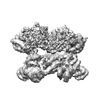
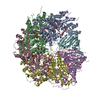



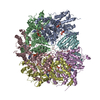

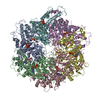
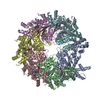



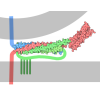
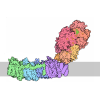

 Z (Sec.)
Z (Sec.) Y (Row.)
Y (Row.) X (Col.)
X (Col.)








